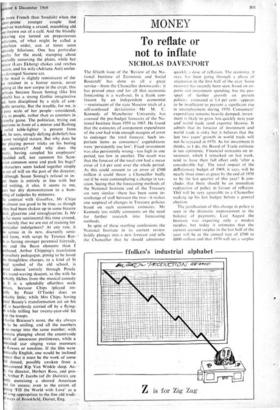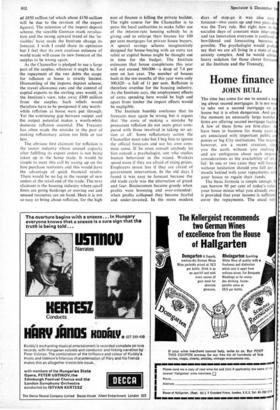To reflate or not to inflate
NICHOLAS DAVENPORT
The fiftieth issue of the 'Review of the Na- tional Institute of Economic and Social Research' has done us all a great service—from the Chancellor downwards: it has proved once and for all that economic forecasting is a wash-out. In a frank con- fession by an independent economist —reminiscent of the state Moscow trials of a self-confessed deviationist—Mr M. C. Kennedy of Manchester University has assessed the pre-budget forecasts of the Na- tional Institute from 1959 to 1967. He found that the estimates of component expenditure of the GNP had wide enough margins of error to endanger the total forecast. Such im- portant items as consumers' expenditures were 'persistently too low'. Fixed investment was also persistently wrong—too high in one period, too low in another. The result was that the forecast of the total GNP had a mean error of 1.4 per cent over the whole period. As this could amount to an error of £500 Million it could throw a Chancellor badly out if he were contemplating a change in tax- ation. Seeing that the forecasting methods of the National Institute and of the Treasury are very similar—there has been some in- terchange of staff between the two—it makes one sceptical of changes in Treasury policies based on such economic estimates. Mr Kennedy too mildly comments on the need for further research into forecasting methods.
In spite of these startling confessions the National Institute in its current review boldly plunges into a new forecast and tells the Chancellor that he should administer quickly a dose of reflation. The economy, it says, has been going through a phase of stagnation in the first half of the year. Some recovers has recently been seen, based on ex- ports and investment spending, but the pro- spect of further growth on present policies estimated at 1.4 per cent --appears to be insufficient to prevent a significant rise in unemployment during 1970. Consumers' expenditure remains heavily damped; invest- ment is likely to grow less quickly next year and world trade (and exports) likewise. It admits that its forecast of investment and world trade is risky but it believes that the last two years' growth in world trade will not be repeated in 1970. As for investment it thinks, as I do, the Board of Trade estimate is too optimistic. Financial restraints on in- vestment. which I remarked on last week, tend to have their full effect only 'after a considerable lag'. The total impact of the deflationary budget of 1969, it says, will be nearly three times as great by the end of 1970 as by the last quarter of this year! It con- cludes that there should be an immediate redirection of policy in favour of reflation. Thik will be very agreeable to a Chancellor making up his last budget before a general election.
The justification of this change in policy is seen in the dramatic improvement in the balance of payments. Last August the Institute was expecting only a modest surplus, but today it estimates that the current account surplus in the last half of the year will be at the annual rate of £500 to £600 million and that 1970 will see a surplus
ffolkes's industrial alphabet Z is for Zig Zag
of £850 million (of which about £150 million will be due to the revision of the export figures). The retention of the import deposit scheme, the sizeable German mark revalua- tion and the strong upward trend of the 'in- visibles' have made the Institute change its forecast. I wish I could share its optimism but I feel that its own cautious estimate of world trade will cause its new forecast of the surplus to be wrong again.
As the Chancellor is pledged to use a large part of the surplus, whatever it might be, for the repayment of the IMF debts the scope for reflation at home is strictly limited. Dismantling of the imports deposit scheme, the travel allowance cuts and the control of capital exports to the sterling area would, in the Institute's view, take away £300 million from the surplus. Such reliefs would therefore have to be postponed if any worth- while reflation at home were put through. Yet the continuing gap between output and the output potential makes a worthwhile domestic reflation essential. The Treasury has often made the mistake in the past of making reflationary action too little or too late.
The obvious first claimant for reflation is the motor industry whose unused capacity after fulfilling its export orders is not being taken up in the home trade. It would be simple to meet this call by easing up on the hire purchase restraints and this would,have the advantage of quick financial results. There would be no lag in the receipt of new orders at the retail end of the trade. The next claimant is the housing industry wheresmall firms are going bankrupt or moving out and unused resources are on hand. Here it i,s not so easy to bring about reflation, for the high
cost of finance is killing the private builder. The right course for the Chancellor is to press the local authorities to make fuller use of the interest-rate housing subsidy he is giving and to enlarge their finance for 100 per cent mortgages for private house buyers. A special savings scheme imaginatively designed for house-buying with an extra tax relief or capital bonus might be thought out in time for the budget. The Institute estimates that house completions this year will not exceed 360,000—a drop of 7.4 per cent on last year. The number of houses built in the ten months of this year were only 300,620—a fall of 11 per cent. Reflation is therefore overdue for the housing industry. As the Institute says, the employment effects of extra spending here would be high and apart from timber the import effects would be negligible.
The Institute humbly confesses that its forecasts may again be wrong but it argues that 'the costs of making a mistake by premature reflation do not seem great com- pared with those involved in taking no ac- tion at all'. Some reflationary action the Chancellor must take but I beg him to ignore the official forecasts and use his own com- mon sense. If he must consult anybody let him consult, a psychologist, one who studies human behaviour in the round. Workers spend more if they are afraid of rising prices. Employers invest less if they are afraid of government intervention. In the old days I found it was easy to forecast because the old trade cycle was the alternation of greed and fear. Businessmen became greedy when profits were booming and over-extended : when profits collapsed they became fearful and under-invested. In the more modern days of stop-go it was also easy forecast—two years up and two years do was the Tory rule. But right now in th socialist days of constant state intervent and tax innovation everyone is confused a bewildered and forecasting becomes possible. The psychologist would proba say that we are all living in a state of ac anxiety complex. And he would advise heavy sedation for those clever forecast at the Institute and the Treasury,







































 Previous page
Previous page